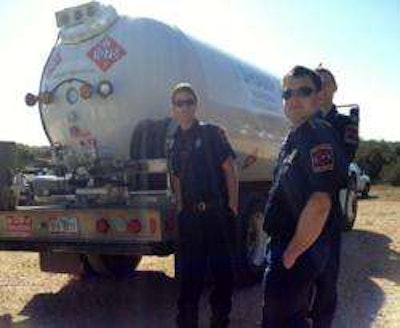
Frank Goree has made a commitment to propane.
A fairly obvious one. He sells it for a living.
However, that commitment runs a lot further than his paycheck. It includes community education.
Goree, through his employer Sharp Propane, has made an active effort to educate and partner with local fire departments in both Bastrop, La. and the Austin, Texas-area. This education complements other industry protocols put into place in order to manage situations involving propane, including the Propane Emergencies Program and the Propane Education and Research Council’s Certified Employee Training Program.
Goree says a major misconception about propane is that no matter what safety precautions are in place, it is a dangerous and explosive fuel in its natural state. However, propane tanks do not explode because they get bumped or jostled, or because of an isolated leak. Goree says they require a source of ignition for any troubles to arise.
This spring Sharp Propane teamed up with the Lake Travis Fire Rescue department to provide a propane training and education program to more than 30 local first responders about the best ways to prevent, avoid and address the potential hazards of propane.
At these training sessions, Sharp Propane provided the firefighters with information about isolating leaks and shutting off tanks, the locations of valves and other critical equipment on underground tanks and a run-down of the extensive safety features built into the bobtail trucks that deliver propane, which are often powered by propane.
Lake Travis Fire Rescue has participated in two Sharp Propane training sessions to-date, led by Goree, along with Michael Bodine, Austin-based Sharp Propane area manager, and Propane Professional Cody Ruthven.
“We’ve developed relationships with these local departments because it’s important that everyone be as educated about propane safety as possible in order to avoid and prevent something bad from happening,” Goree says. “Oftentimes, firefighters are the first ones people call when they smell a gas or propane leak, and knowing how to properly identify and cut off those leaks can prevent a larger problem from happening. Whether it’s our tank or anybody else’s, we do this because we want to keep the industry from getting a black eye, and we want to keep everybody as safe as possible.”
In 2012 Goree attended a hands-on education and training session through Texas A&M’s Engineering Extension Service (TEEX) that was geared toward developing relationships between members of the propane industry and emergency responders.
The training, he says, offered him further expertise on the importance of propane safety and education, and an understanding of how to best speak to firefighters about propane.
“Education programs like that are really important because it gives both of us the chance to see and understand what the other one does,” Goree says. “In an emergency, we deal with firefighters all the time. Through this training, the two different entities can work better together because we completely understand the other’s protocol, and they understand aspects of the tanks that are important for them.”
At the two-day training at A&M, Goree and other industry professionals learned about fire department protocol, different structures and their hazards, different spray patterns and more, while the firefighters were schooled on the aspects of a propane tank, bobtails and pipe pinchers to better enable them to isolate and cut off a propane leak. The joint school combined traditional and hands-on experience, and, even though there were instructors for the course, the industry professionals soon became the teachers, just as Goree has gone on to utilize this experience for Sharp Propane.
Sharp Propane has also spent time educating the volunteer fire departments in Bastrop and Smithville. Most volunteer fire departments are at a disadvantage when it comes to training and education materials because they operate on a very limited budget, and sometimes cannot devote adequate funds to developing hazardous material training sessions, Goree says.
Sharp Propane has been forthcoming with the Bastrop fire department, driving their trucks out to the fire station to go over the bobtail’s safety features, and providing them with information about the basics of propane and propane safety.
Additionally, Sharp Propane employees volunteer at local fire departments and dedicate themselves to these efforts on a personal level outside of work as well.
Goree serves as a volunteer with the Bastrop Fire Department, Cody Ruthven, a Sharp Propane employee that helped lead the Lake Travis Fire Rescue training session, is a volunteer with the Taylor Fire Department, while other Sharp Propane employees volunteer with the Pedernales Fire Department in Briarcliff and a local department in Bryan/College Station.









